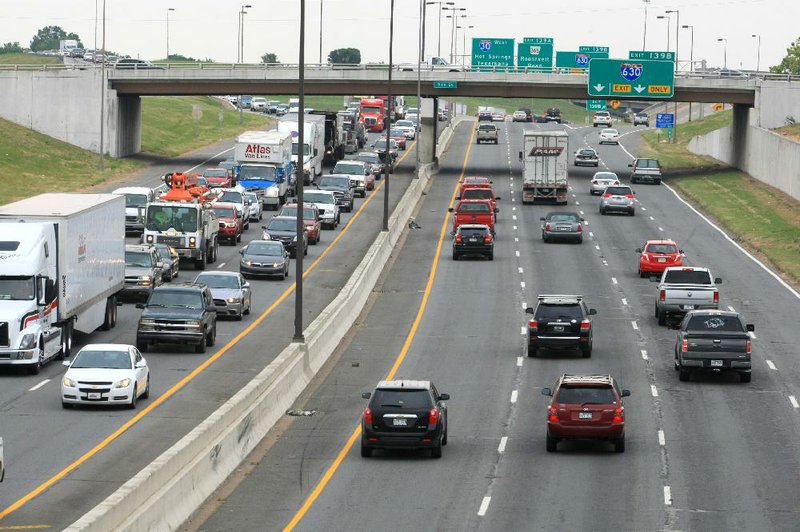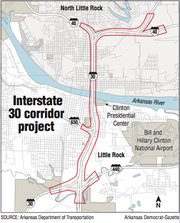A large part of the money devoted to the $631.7 million project to improve the Interstate 30 corridor through downtown Little Rock and North Little Rock can't be spent on it because I-30 is a six-lane highway, according to a lawsuit filed Wednesday in Pulaski County Circuit Court.
The lawsuit contends that a "plain" reading of Amendment 91, which governs the money spent under the $1.8 billion Connecting Arkansas Program, limits improvements to four-lane highways or two-lane highways that are widened to four lanes.
Amendment 91 was approved by voters in 2012. Among other things, it put in place for 10 years a half-percent increase in the statewide sales tax to help fund the Connecting Arkansas Program, which focuses on regionally significant highway projects.
The lawsuit, filed on behalf of five Arkansas residents, also said the language of Amendment 91 prohibits spending the sales-tax proceeds on an ongoing project to widen a section of Interstate 630 in west Little Rock.
The amendment language defines "four-lane highway improvements" to include "four-lane roadways, bridges, tunnels, engineering, rights of way and other related capital improvements and facilities appurtenant or pertaining thereto, including costs of rights-of-way acquisition and utility adjustments."
The language also includes "the maintenance of four-lane highway improvements constructed with proceeds of the bond" within the definition of "four-lane highway improvements."
The amendment contains other references to four-lane highways, including that the bonds issued as part of the program are payable from the Arkansas Four-Lane Highway Construction and Improvement Bond Account.
The "obvious, common, plain and unambiguous language of Amendment 91" limits spending proceeds from the temporary tax increase to "state highways of four lanes or to enlarge state highways from two to four lanes," the lawsuit said.
The I-30 project, known as 30 Crossing, is to widen a 6.7-mile section to 10 lanes from six lanes. The I-630 project involves work to widen a six-lane section to eight lanes.
If four means four, then the I-30 and I-630 projects would have to be built using other monies, the attorney who filed the lawsuit said Wednesday. Money from the Connecting Arkansas Program totals about $448 million for the I-30 project and about $58 million for the nearly $90 million I-630 project, according to the lawsuit.
"As the 30 Crossing is proposed right now, I'm not saying the Highway Department can't get funds from somewhere else, but they can't use the funds they are currently using through the Connecting Arkansas Program," said Justin Zachary of the Conway law firm of Denton and Zachary, which brought the lawsuit. "Based on the language of the amendment, it's pretty clear the money is supposed to be spent on four-lane highways. The project on I-30 is not for a four-lane highway."
The lawsuit seeks a judgment that spending sales-tax proceeds on the project is unconstitutional. It also asks that defendants be "restrained and enjoined from continuing to approve or expend funds" on projects other than four-lane highways or enlarging highways of less than four lanes.
The lawsuit also requests that any money spent on those projects be returned to the bond account established to handle the Connecting Arkansas Program monies.
The lead plaintiff in the lawsuit is Richard Mason of El Dorado. He is a registered professional geologist, downtown developer, former chairman of the Department of Environmental Quality Board of Commissioners and former president of the Arkansas Wildlife Federation. He writes a weekly column for the Arkansas Democrat-Gazette.
The other plaintiffs were identified as Shelley Buonauito and Sara B. Thompson, both of Fayetteville; Mary Weeks of Little Rock; and Verlon Abram of the Cleburne County community of Wilburn.
Defendants include the five members of the Arkansas Highway Commission: Chairman Dick Trammel of Rogers, Tom Schueck of Little Rock, Robert Moore Jr. of Arkansas City, Alec Farmer of Jonesboro and Philip Taldo of Springdale.
Other defendants include Scott Bennett, the director of the Arkansas Department of Transportation; state Treasurer Dennis Milligan; state Auditor Andrea Lee; Larry Walther, director of the Arkansas Department of Finance and Administration; and Gov. Asa Hutchinson.
A spokesman for Hutchinson, J.R. Davis, said the governor declined to comment on the lawsuit and referred questions to the Transportation Department. A department spokesman, Danny Straessle, said the department had not been served as of Wednesday afternoon, was unaware of the lawsuit and had no comment.
Moore, who pushed for a highway construction program that resulted in Amendment 91 while he was speaker of the Arkansas House of Representatives, also withheld comment.
Jonathan Barnett of Siloam Springs, who was the lead sponsor of the legislation that resulted in Amendment 91 when he was a state representative, said the intent wasn't to limit work to four-lane highways.
"My intention was, and the spirit of the legislation was, that it could definitely be spent for [30 Crossing]," said Barnett, a former member of the state Highway Commission. "I even think we discussed that. It was part of public information, as far as what we discussed it with the public and tried to sell it to the people."
The Democrat-Gazette reported in December 2011, 11 months before the amendment was voted on, that 30 Crossing was part of the Connecting Arkansas Program, citing Bennett's comments at a commission meeting that month.
But Zachary said legislative intent can't be interpreted when people enter the voting booths.
"This is not an ordinary statute passed by both houses of our Legislature," he said. "This was language voted on by the taxpayers. When that language is voted on by the taxpayers, you have to look at that language a little bit more closely.
"When a voter goes into the booth and votes for construction on four-lane highways, that's what voters are voting on. They are not voting for six-lane highways or eight-lane highways. They voted for four-lane highways."
Metro on 11/08/2018



